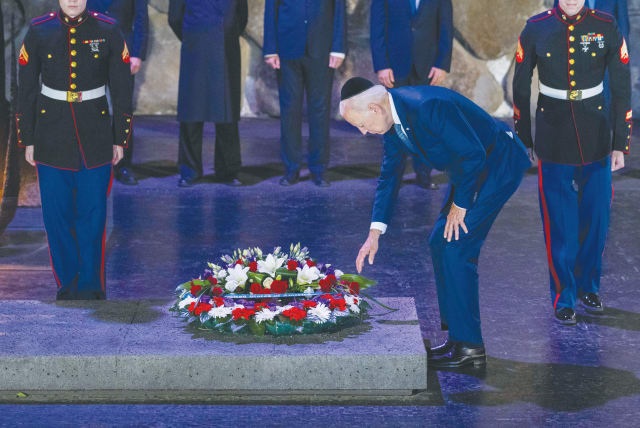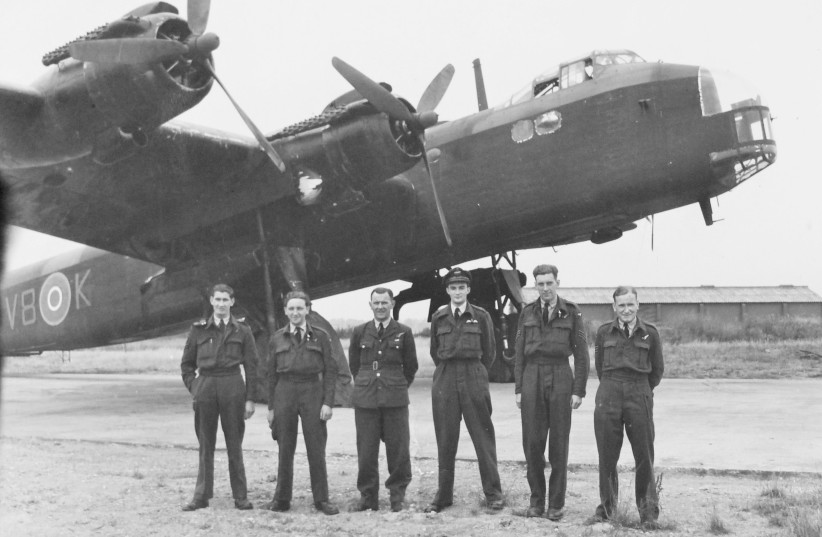Holocaust Remembrance Day: Did the Allies do enough to help the Jews? - opinion

In remembering the Holocaust, there is also a place to recall the behavior of the principal Western allies who came up short in protecting the Jews.
Yom Hashoah memorial ceremonies for the murdered six million rightly focus on the crimes of the Nazis and their collaborators. But in remembering the Holocaust, there is also a place to recall the behavior of the principal Western allies who, while paying an enormous price in blood and treasure to defeat the Axis, came up short in protecting the Jews.
In June 1940, Britain stood alone against the Nazi onslaught: France had fallen, the United States was neutral, and the Soviet Union had a non-aggression pact with Germany.
Isolated, and with its back to the wall, appeasers urged prime minister Winston Churchill to come to terms with the enemy. But Churchill understood that any such accommodation would mean defeat, and he roused his people with the immortal words: “We shall fight on the beaches; we shall fight on the landing grounds… we shall never surrender.”
Britain battled on alone until Soviet and American forces eventually joined the fray. The first British victory was at El Alamein in North Africa. That was followed by British and Allied landings in Italy and France, and the ultimate advance into Germany. All this was accomplished while RAF Bomber Command and the US Army Air Force turned German cities into rubble.
One such RAF attack had implications for my own family. Following the January 16, 1945, raid on Magdeburg, my father, living the precarious existence of a Jew in Nazi Germany, exploited the flames, destruction, and chaos in the aftermath of the bombing to escape to the countryside. He always said that the RAF saved his life.
It wasn’t just my father. On the eve of the war, through the Kindertransport, Britain took in some 10,000 Jewish children from Germany, Austria, and Czechoslovakia. They were often the only members of their families to survive.
Yet with millions of Jews trapped in Europe, the Kindertransport was a drop in the ocean. The UK had the power to do much more but refused to do so.
On the eve of the Final Solution, Britain issued the infamous May 1939 Palestine White Paper which shut the gates of the homeland to Jewish immigration.
London determined that the Jews had no alternative but to support Britain in the coming conflict with Germany, while the Arabs needed to be appeased. To safeguard the Suez Canal and ensure the flow of Middle East oil, Whitehall decided to placate Arab opinion – and, in so doing, sealed the fate of an untold number of European Jews.
Later, when the scope of the genocide became known in London – and in response to Jewish appeals – Churchill instructed the RAF to bomb the extermination camps. However, no such operation ever materialized.
At war’s end, Britain stubbornly persevered with the White Paper. Survivors of the inferno were still denied immigration permits to Mandatory Palestine – those attempting to arrive without the requisite permission were transferred to detention camps in Cyprus, and even back to Germany. Moreover, Britain persisted in opposing Jewish aspirations for independence.
In these circumstances, the Jewish underground intensified its armed insurgency against the Mandate. When, in May 1948, British colonial rule finally ended, most Jews said good riddance.
The US and the Holocaust
America’s vital role in the defeat of Nazi Germany is unquestionable and can be readily appreciated firsthand by touring the Normandy beaches of the June 1944, D-Day landings – as I did in 2019 together with my daughter, an IDF officer.
Steven Spielberg’s epic Saving Private Ryan, which we watched again the night before the voyage from Plymouth to Le Havre, gives cinematic expression to the enormity of the Allied effort and to the immense sacrifice of American blood.
Here too my family has a personal debt. Until his death, my father celebrated April 13, the day in 1945 when the US Army’s 102nd infantry division entered Uetz and liberated him – in his words, “a very lucky day.”
But while America was instrumental in the victory over Germany, it is sometimes forgotten that Washington didn’t declare war on the Nazis – it was Hitler who declared war on the US.
Germany invaded Poland in September 1939; Denmark and Norway in April 1940; Belgium, Holland, Luxembourg, and France in May 1940; Yugoslavia and Greece in April 1941; and the Soviet Union in June 1941. All the while, America remained neutral.
Although president Franklin Roosevelt backed the Brits in the 1940 Battle of Britain, the US was not a combatant, and to Churchill’s great chagrin, London had to pay for Washington’s Lend-Lease support.
American isolationism ended on December 7, 1941, with the Japanese attack on Pearl Harbor. Hypothetically, just as the Soviets fought the Germans without fighting the Japanese, America could have fought the Japanese without fighting the Germans. But any strategic dilemma Washington faced was solved by the December 11, 1941, Nazi declaration of war.
Throughout, America maintained strict restrictions on the admittance of Jewish refugees – the State Department consistently opposed giving any priority to immigrants fleeing racial or religious persecution.
In 1939 alone, close to 300,000 German Jews applied for US visas, creating an 11-year waiting list.
Public opinion bolstered bureaucratic callousness. A 1938 poll showed that 82% of Americans opposed admitting larger numbers of Jewish refugees.
The voyage of the St. Louis was emblematic of the situation. Carrying 937 refugees, the ship sailed from Hamburg for the Western Hemisphere, but was denied entry to Canada, Cuba, and the US. Despite a campaign by Jewish organizations, Washington refused to budge, and the vessel was forced to return to Europe, where many of its ill-fated passengers ended up in the camps.
On April 4, 1944, Auschwitz was first overflown by US reconnaissance aircraft. Over the following months, American bombers conducted a series of operations in proximity to the notorious death camp, including raids upon nearby oil refineries and industrial targets.
In parallel, from May 15 to July 9, 1944, Hungarian Jews were being transported en masse to Auschwitz: 45 cattle cars per train, 4 trains per day, 12,000 Jews in a single day – 424,000 gassed in total.
Reports about the mass murder at Auschwitz had been broadcast by the BBC (June 15, 1944) and published in The New York Times (June 20, 1944). Yet despite the activity of American bombers in the immediate vicinity, no attempt was made to destroy the extermination facilities or the rail lines leading to them.
Surely, this history also deserves a place in our national memory.
The writer, formerly an adviser to the prime minister, is chair of the Abba Eban Institute for Diplomacy at Reichman University. Connect with him on LinkedIn, @Ambassador Mark Regev.
Jerusalem Post Store
`; document.getElementById("linkPremium").innerHTML = cont; var divWithLink = document.getElementById("premium-link"); if (divWithLink !== null && divWithLink !== 'undefined') { divWithLink.style.border = "solid 1px #cb0f3e"; divWithLink.style.textAlign = "center"; divWithLink.style.marginBottom = "15px"; divWithLink.style.marginTop = "15px"; divWithLink.style.width = "100%"; divWithLink.style.backgroundColor = "#122952"; divWithLink.style.color = "#ffffff"; divWithLink.style.lineHeight = "1.5"; } } (function (v, i) { });

